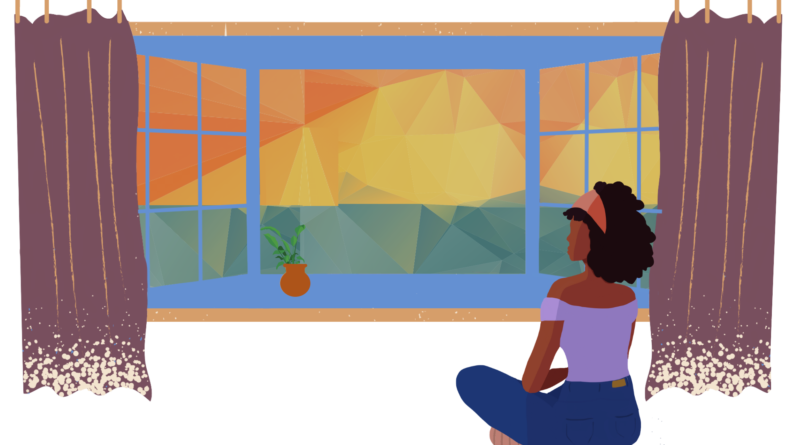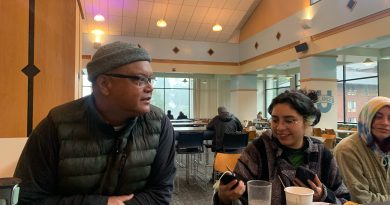Lost connection: How students can get through these rough times
From ongoing threats to social justice, smoke-filled skies induced by climate change, heightened political turmoil and a global pandemic, mental and emotional stress burdens our bodies and minds.
We are all being brought together through these experiences and our social isolation shouldn’t make us feel like we are going through this alone. There are people and resources to reach out to.
How the Pandemic is Affecting Us
Liza Auerbach, Ph.D, psychologist for Humboldt State University’s Counseling and Psychological Services, explains how all of these realities impact our mental health.
She said constant messages and reminders of the threats of the world that tell us we are not safe creates trauma in our brains.
“Even if we are consciously tuning it out and not aware that it’s happening in the moment, it doesn’t mean that our brain isn’t processing it.” Auerbach said. “It’s so hard for our brains to attend to or focus on anything with these existential threats.”
The issues of our world do require our activism but Auerbach insists they do not need our constant attention. We need to try to create a filter between ourselves and the world by noticing our news and media intake. This can look like turning our phones on silent, limiting our social media use or practicing not listening to the daily news.
“The world is literally and metaphorically on fire right now.
And so many of us are being called to activism and
being called to pay attention to what is happening
in our community and the country and the world.
Turn the notifications off. Let the world take care of itself for a little while.”
Liza Auberch
Working from our homes makes it difficult to have established boundaries between work-time and relax-time. Normally, we receive cues from our environment such as changing location, which sends signals to our brain letting us know it’s time to be focused or it’s time to slow down. Creating daily routines or rituals can help restore those cues in our brains.
Some tips Auerbach suggests for creating routine includes having “ending rituals” or “beginning of the day” rituals. This can look like closing our computers at the end of class, changing locations or something as simple as putting a sheet over our workspaces, or changing clothes.
If you try any of these tips and suggestions and feel like they are not working, that may be a sign to reach out to CAPS and get more help.
What Students Are Feeling
Mary Johnson Smith, Accessibility Advisor with the Student Disability Resource Center, whose role is to help facilitate access for students with disabilities, provides insight to the struggles many students are facing in their classes.
“Something I am hearing again and again with students
is the lack of connection.
None of the regular ways we connect in classes
and things like that are easy right now.
Mary Johnson Smith
Many students have shared that they feel they are missing out on the chance to connect with their peers, a consequence of online learning. One example of how connections can be lost is disabling discussion boards after it’s due which doesn’t encourage more meaningful interaction.
“I think any practices that teachers can have to encourage communication between people in classes whether those are discussion forums should really be encouraged,” said Smith.
In her role as an advisor, Smith advocates on behalf of students for better accessibility/disability accomodations in their classes. Some of these accommodations look like providing closed captioning when possible and reminding professors that students’ cameras are not required to be on when in class. Smith believes that although these may be best for students with disabilities, they are beneficial to everyone in class and serve as good pedagogy.
“There definitely are shortcomings and I find a few students really frustrated because they feel like they’re getting the message from the administration that, ‘We are offering you every bit as good as it was always’. And that’s not really how they [students] are feeling,” Smith Said. “I think that it’s only respectful to acknowledge that. And not try to gaslight someone into saying they are getting the same value they had planned for.”
Remembering to take breaks, turning off our screens and recognizing that we will have good days and bad days are some of Smith’s recommendations for maintaining balance.
“Be flexible like you have never been before, in listening to what students need and listening to your own needs in every way you can,” Smith said.
Support for Students
Robert Keever, CARE services coordinator in the Office of the Dean of Students, recommends that if students are struggling financially or their mental health, to reach out to the CARE office. CARE acts as a service that connects students to the support they need.
“The idea is for students to know that they’re not alone in this and there will be resources to help them get through it,” Keever said. “While school and education is important, if they need to take time away from class, take that time. If they need to be with family or do something for themselves that makes them feel a little more comfortable and allows them to be better focused on their education, take that time.”
There’s many services for students seeking help, whether it’s through talking one-on-one to a therapist, attending mental health related support groups, financial help, food or disability accommodations. Above all having compassion for yourself and others goes a long way in this world.
HSU Resources
All of these services are free
| CAPS Counseling and Psychological Services Free counseling, mental health resource workshops, mindfulness-centered app recommendations and self guided counseling prezis CARE Campus Assistance, Response, and Engagement Support for students experiencing extenuating circumstances related to food security, housing needs, mental health services, medical services, and other basic needs. | SDRC Student Disability Resource Center provide service, support, and resources for students with disabilities to maximize educational opportunities CTL Center for Teaching and Learning Offering a variety of services, tips and resources to assist faculty in enhancing student learning Learning Center Learning Center Provides Academic Care Counseling, through peer coaching, tutoring and writing support. |
All of these services are free.




